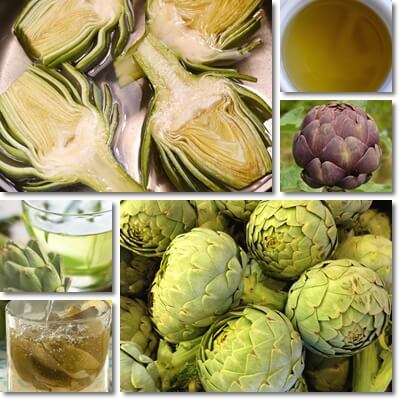Did you know you can make artichoke tea from artichoke leaves? Artichoke tea is an especially healthy tea, good for gallbladder pain in gallbladder attacks, high cholesterol and indigestion, among other benefits. Artichoke tea is a hepatoprotective with benefits for liver function and liver health. The main biologically active components in artichoke tea responsible for its health benefits are silymarin and cynarine, also found naturally in milk thistle.
What is artichoke tea?
Artichoke tea is a herbal infusion made from artichoke leaves. Traditional artichoke tea is made from the common globe artichoke (scientific name: Cynara cardunculus var. scolymus), a cultivated variety of artichoke. The tea can be made from dried and finely ground artichoke leaves (artichoke leaf powder) or from coarsely ground artichoke leaves, which is the case for most commercially available artichoke tea. Home-made artichoke tea is sometimes made from fresh artichoke leaves boiled in water.
Artichoke tea in consumed throughout Europe, and is a favorite Romanian traditional tea alongside bay leaf tea, hawthorn tea, rose hip tea and sea-buckthorn tea.

What does artichoke tea look like?
Artichoke tea typically ranges in color from amber to a medium orangey-brown to a darker slightly reddish-brown, depending on concentration. But if the artichoke leaves are not completely dried, the tea can turn out a light green color which simply indicates a fresher artichoke leaf material. Store bought artichoke tea is available as a brown powder packed in individual tea bags, or as coarse, loose dried leaf material of a yellowish-brown to grayish-green color.
What does artichoke tea taste like?
Artichoke tea is known for its bitter taste with earthy, woody, leafy, green flavors. The taste of the tea ranges in intensity according to the water to leaf material ratio (the more leaf material you add, the stronger and more bitter the taste). Artichoke tea is a rather unpalatable tea, one that you drink out of necessity rather than pleasure. You can however sweeten it with raw honey (see honey varieties).
Where to buy artichoke leaf tea
If you are wondering where to buy artichoke tea, big online retailers such as Amazon most likely carry the tea, as well as smaller retailers with a focus on herbal teas and herbal supplements. You should also find artichoke tea at local hypermarkets and supermarkets, in the health food aisle or ethnic food aisle, at health food stores, select ethnic grocery stores, ethnic food markets and sometimes even farmer’s markets.

Artichoke tea benefits and uses
- Benefits for indigestion. Artichoke tea stimulates the production of bile which supports normal digestion processes, helping relieve indigestion.
- Excellent digestive aid. Artichoke tea supports gallbladder function by stimulating the production and elimination of bile, acting as a digestive aid for those with recurrent indigestion caused by gallbladder problems.
- Benefits for gallbladder pain. Artichoke leaf tea helps alleviate gallbladder pain during gallbladder attacks (biliary colic).
- Good for gallbladder attacks. Regular consumption of artichoke tea helps with gallbladder attacks with and without stones, mitigating biliary pain.
- Hepatoprotective properties. Biologically active components in artichokes and artichoke leaf tea, namely silymarin and cynarine, help protect the hepatic cell, supporting liver regeneration processes.
- Promotes liver health. Artichoke leaf tea is known to support normal liver function via antifibrotic, anti-inflammatory, antioxidant and regenerative properties, and can be used as an adjuvant in liver disease and gallbladder dysfunction.
- Diuretic properties. Artichoke tea has natural diuretic properties, increasing urine output and stimulating the discharge of urine.
- Good for kidney function. The diuretic properties of artichoke tea support normal kidney function, contributing to benefits for kidney health.
- Antioxidant and anti-inflammatory properties. Artichoke tea contains bioactive ingredients such as silymarin and cynarine with scientifically proven antioxidant and anti-inflammatory properties.
- Detoxifying properties, derived from the biological activities of active ingredients supporting liver health, primarily silymarin, silybin, silidianin and silicristin, and cynarine.
- Cholesterol-lowering properties. Artichoke tea is a source of silymarin and studies show silymarin can inhibit the synthesis of very low density (VLDL) and low density cholesterol (LDL), lower triglyceride levels, and raise high density (good) cholesterol (HDL).
How to make artichoke tea
- For artichoke tea bags:
Infuse 1-2 artichoke tea bags in a cup of hot water (150 ml – 250 ml), cover and leave for 5-15 minutes, or mix and press on the tea bags occasionally to help with the release of the bioactive components. Alternatively, follow the instructions on the label.
- For loose artichoke leaf tea:
Infuse 1-2 teaspoons of loose artichoke leaf material in a cup of hot water (150 – 250 ml) or use a loose tea infuser or loose leaf herb strainer. Either leave covered for 5-15 minutes or mix the leaf material to help with the release of the bioactive components.
- How to make artichoke tea at home
Artichoke tea recipe no. 1: Wash and dry your artichoke leaves with a paper towel. For coarse leaf material, portion to your liking. Dry in the oven, on the kitchen counter or in the sun (covered with a cloth). For finer leaf material, use a food processor, kitchen grinder or manual grinder. Place the leaf material in a glass jar, seal with a lid and keep in a dark cool place. To make the tea, add 1-2 teaspoons of artichoke leaf material to a cup (150 ml – 250 ml) of hot water.
Artichoke tea recipe no. 2: Wash and dry your artichoke heads or artichoke leaves with a paper towel. Portion the artichoke heads by cutting in half or quarters (the individual leaves can be left as they are or cut in half). Simmer in a pot of water for 20-30 minutes (half a liter of water per artichoke head), allow to cool and drink the resulting tea. Leaving the artichoke heads or leaves in water can turn the tea into a maceration.
Artichoke leaf tea side effects
Artichoke tea is generally safe for consumption and has but one major side effect: allergic reactions. If you are allergic to artichokes, then it is imperative you avoid the tea, as well as artichoke leaf extract preparations.

